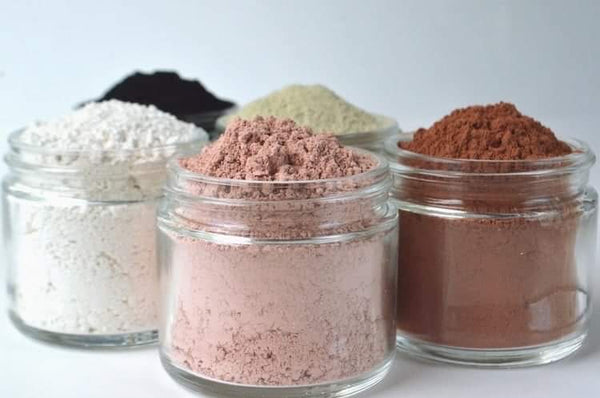THE BENEFITS OF A NATURAL CLAY FACE MASK

What is Clay?
Clay is a naturally occurring substance that is mineral rich and can be found in soil, sediment and volcanic ash. In general it is a soft, fine-grained powder. Some clays can contain over 50 minerals including magnesium, calcium, iron and potassium.
They have been used for centuries as part of beauty regimes to improve the health of skin. Clay masks are a completely natural way to cleanse, purify and exfoliate without harsh chemicals or irritants.
Why natural clay over other chemically enhanced products?
Clays make an excellent base for masks and scrubs and can be used to deeply cleanse the skin and improve its tone and texture. They are an all-natural ingredient that provides a clean, toxin free, vegan skincare alternative to chemically enhanced products.
Because the clays aren't pre-hydrated they need no artificial preservatives and have a long shelf life.
What are the benefits of clay for my skin?
Clay has the ability to quickly pull dirt and bacteria from the pores and absorbs excess oil, preventing breakouts and leaving skin looking healthy, revitalised and beautifully soft.
The slight gritty texture of clay when hydrated gently exfoliates and polishes dead skin cells leaving skin silky smooth. It detoxifies, refreshes and nourishes the skin.
Although not clinically proven, studies suggest that using clay regularly may promote production of collagen and that with longterm use skin can appear more toned and tightened with a reduction in the appearance of fine lines and wrinkles.
What if I have really dry skin? Can I still use a clay mask?
Clay is certainly more suited to people with normal to oily skin types because of its high ability to draw moisture from the skin, however Red Kaolin clay is often recommended for dryer skin types. If your skin is very dry you may want to limit the use of face masks to a maximum of once a week as over using could potentially dry your skin further making it uncomfortable.

What are the different types of clay?
There are many different types of clay, some of the most popular include Bentonite, Kaolin, Brazilian Kaolin (Red, Pink, Yellow, Purple and Natural) French Green, Sea Clay.
All clays have different properties and are suited to different skin types. They all have varying levels of absorption and different PH Levels. The higher the absorption level the more moisture the clay will draw from your skin.
Which is the right clay for my skin type?
The 3 clay types I have chosen are -
Fuller’s Earth - for its excellent absorption properties making it perfect for oily skin types by soaking up the excess oil. It is also believed that Fuller’s Earth may have skin lightening effects, so is a popular choice for reducing the appearance of dark spots, however this is not clinically proven.
Red Brazilian Kaolin - Stimulates blood circulation and may help your skin retain moisture making it more suitable for dry skin.
Pink Brazilian Kaolin - has a ph level closest to that of human skin and a very fine, powdery texture, making it perfect for sensitive skin.



Why Kaolin over Bentonite?
Kaolin clays in particular are light in texture, they are a lot gentler on the skin and blend well into a smooth paste.
Bentonite clay has an absorption level of 300 to 700% meaning that not only will it absorb excess oil but possibly all the other necessary fluid needed to keep skin nourished. The very fine, powdery texture. Kaolin clay has an absorption level of only 65%, making it more suitable for all skin types and less likely to dry skin and strip it of its natural oils.
The ph level of Fuller’s Earth and Kaolin clay is also closer to that of our own skin.
PH LEVELS
Kaolin - PH 6
Fuller’s Earth - PH 7.5
Bentonite - PH 8 - 9.7
How do I use a clay face mask?

Clay masks are very easy and simple to use.
All you need is -
- Your chosen clay
- A non-metallic bowl and spoon
- Purified water or floral water (my favourite being rose for its anti-inflammatroy properties, reducing skin redness and puffiness)
- a flat bristle mask brush or foundation brush (optional as fingers will work too)
Method -
- Mix a couple of teaspoons of clay with equal parts of floral water to form a paste.
- Apply to the skin using your finger tips or flat brush, avoiding the areas around the eyes and nostrils.
- Allow to set for around 15 minutes and wash off with warm water. A Konjac sponge or soft face cloth can be used.
So to sum up….
Mask made from clays, which are essentially a type of dirt dug from the ground and used for hundreds of years can have many health benifits for our skin. But be sure to limit to twice a week, once if your skin is extremely dry.

